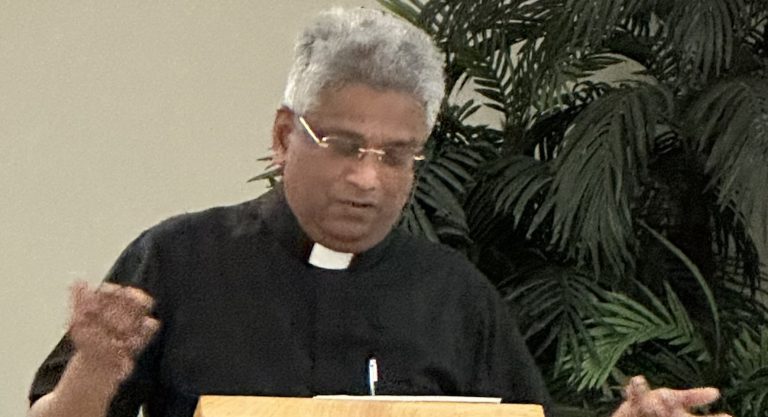SECOND SUNDAY OF LENT
First Reading • Genesis 15:5-12, 17-18
Psalm • 27
Second Reading • Philippians 3:17 – 4:1
Gospel • Luke 9:28-36
Maria sat alone in the hospital chapel, her heart breaking for her sick child. Days felt like years, and hope seemed to flicker like a dying flame.
An elderly woman quietly entered and lit a candle nearby. She noticed Maria’s tears and gently whispered, “I once sat here too… praying for my son.”
Maria’s eyes widened. “Did he get better?”
The woman smiled softly. “He did. But it was in that waiting that I learned—God’s light is still shining, even when we can’t see it.”
Maria sat in silence, watching the candle glow. Her burden remained, but the flame reminded her: hope is never far, even in the darkest moments.
The Transfiguration of Jesus reminds us that even in our darkest moments, God’s light can break through. Though the disciples had to come down from the mountain, they carried the light of that experience with them—just as we must hold onto faith even when life’s challenges return.
The Transfiguration assures us that beyond every trial, God’s glory awaits. That is the hope which keeps us moving forward.
Pope Francis has given this Jubilee Year 2025 the theme “Pilgrims of Hope”. He wants us all to recognize that this world and all that is in it is only temporary. We are on a journey to a life that is greater than this earthly life. As believers in Jesus, it is our mission to share our hope with others – a hope that is founded in God’s unconditional love for us.
Saint Paul echoes this theme in today’s second reading. “But our citizenship is in heaven, and it is from there that we are expecting a Savior, the Lord Jesus Christ”. This life that we are looking forward to is a total restoration of the whole world.
This is possible because Jesus died for us and rose from the dead.
This is the hope our world is in such desperate need of. There is good news. We don’t have to let ourselves get caught circling down the drain of despair. We can have hope. It is a hope that is not based on this world and its passing pleasures.
Rather, it is a hope based on the love of God for us that never changes. It is a hope based on the love of God that is revealed in Jesus Christ, the one who loved us enough to die for us.
Even though this hope looks toward Heaven for its ultimate fulfillment,
it doesn’t mean that we are not grounded in the realities of this world and its problems. Not at all. Jesus commands us to love our neighbor and to serve the poorest among us.
Our faith compels us to get involved in the suffering of this world, not to escape from it. At the same time, we come to it with a new perspective. We see that the suffering of this world is temporary.
As people of service, we will fail and have set backs. As people of love, our hearts will get broken. But we can rest assured that God has already won the victory. Everything that is lost will be restored. Every sin will be forgiven, and every good we have done in love will be rewarded.
Today’s gospel also speaks to us about hope. It takes place just a week after Jesus told His disciples that He would be put to death. When Jesus invites Peter, James, and John to go up the mountain with Him to pray, they were probably still struggling to understand what He meant.
This scene also reminds us of Jesus’ agony in the garden. Remember it is Peter, James, and John whom Jesus takes with Him to ask God to remove the cup of suffering from Him.
Saint Luke tells us that, before Jesus is transfigured, Peter, James, and John had fallen asleep, just like they would at the Garden of Olives. So, the Transfiguration of Jesus is really looking ahead to His death and resurrection.
So why did Jesus bring Peter, James, and John up the mountain with Him? It was to give them hope. They would see Jesus being betrayed by Judas. They would see the soldiers dragging Jesus away to be crucified.
It would be a great shock for them. By being transfigured in their sight, Jesus was giving them a preview of the resurrection. That knowledge was meant to strengthen them as they witnessed all that Jesus had to suffer.
Now we know that Peter would eventually deny Jesus. James would run away with the rest of the apostles. But John stayed by Jesus’ side up to the moment that He was crucified and died.
He was also the first to believe that Jesus had risen from the dead when he saw the empty tomb on Easter morning. Could it be that the experience of the transfiguration strengthened John’s faith?
Just so, we are called to draw our hope from the resurrection of Jesus from the dead. God wins in the end. Let us look to Jesus and make Him the center of our hope.
At the same time, let us share our hope with others. That is what Pope Francis is asking us to do in this Jubilee Year – to be signs and sources of hope for others as we pass through this life with our hearts focused on the life to come.

